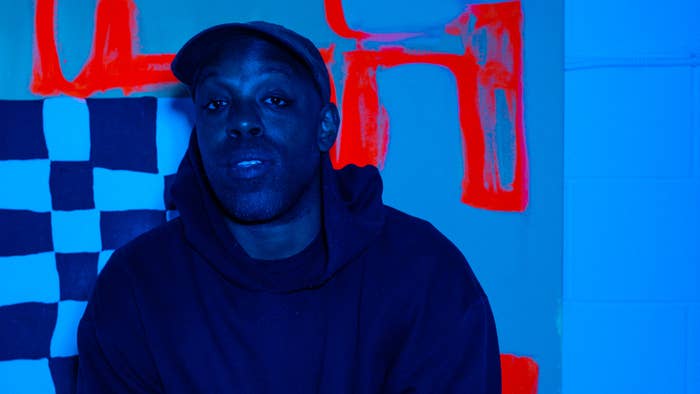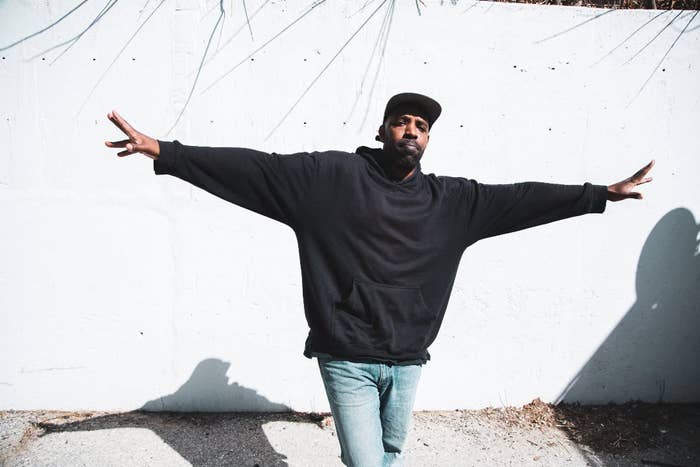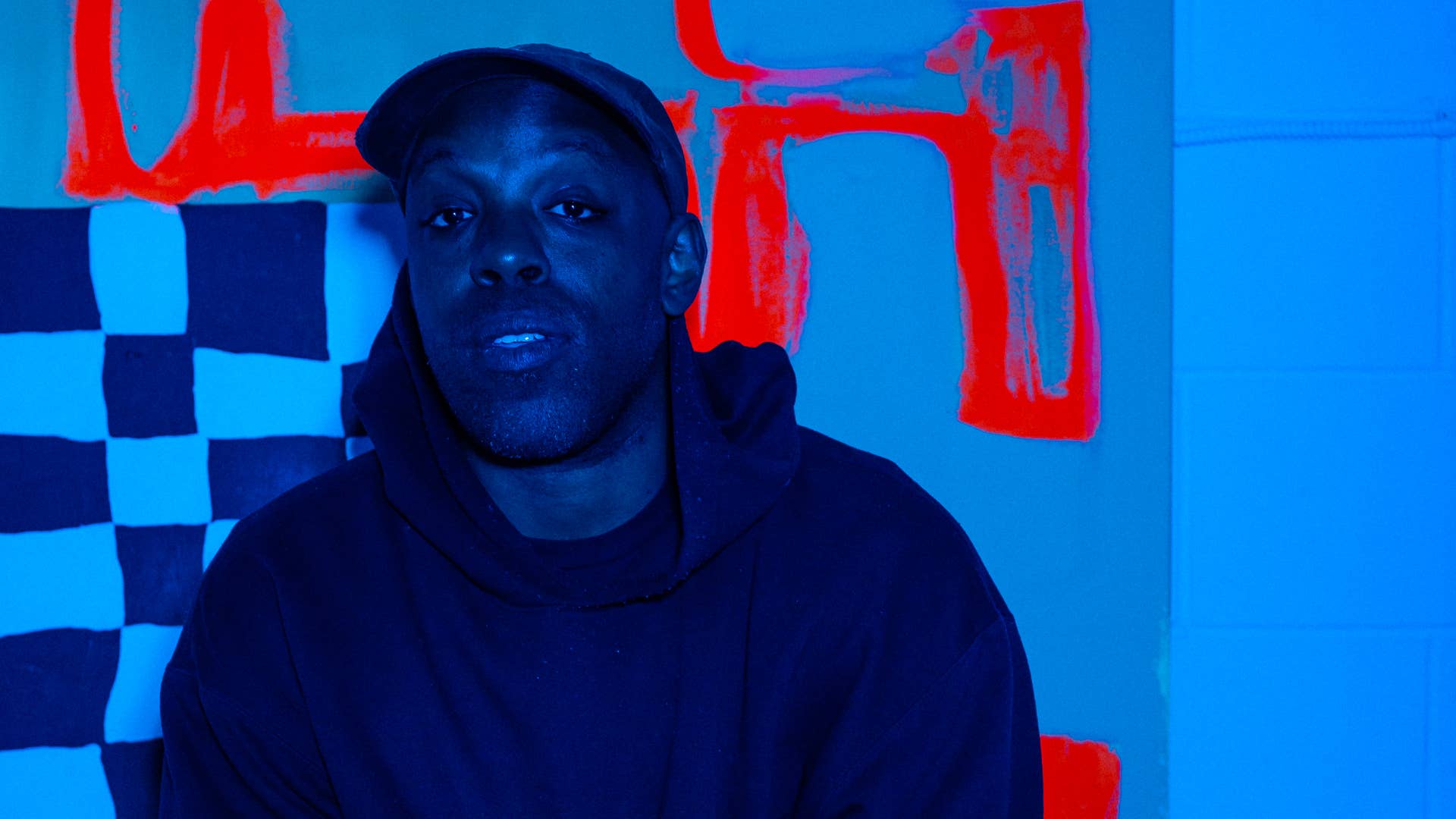
TAO is an apt title for Shad’s latest album. That’s because few of his showbiz peers are equally enlightened. Ahead of the 22-date TAO tour (kicking off April 29) the rapper not only discussed spitting lauded and timely rhymes about gig economy gauges and addictive tech for that LP. And he didn’t just look back on being part of the Peabody-winning docu-series Hip-Hop Evolution, or consulting on the ambitious upcoming Black Life: A Canadian History. He also gave zen-like—not to mention rare—comments about his tumultuous 2016 exit from CBC’s flagship arts program q.
What’s more: the MC also told us about letting such yin and yang fall out of harmony while (very hilariously) standing his ground against one of the most (perhaps misguidedly) popular platforms in music. To paraphrase Shad below—there are times for Taoism, but sometimes rappers are better served by The Art of War.

You’ve been praised for rapping outside your sonic comfort zone on the TAO favorites “Slot Machines” and “Work.” One overlooked track: “Body (No reason).” Its bedrock-hard beat changed my idea of what a “typically jazzy Shad song” could be.
Well, I love music that has an excitement to it. And that can be of any genre. Dom Dias, who’s done a lot of different work with a lot of people, sent me that beat. And I quickly told him, “It’s dope, let me rock on this one.” Especially when I think of a full-length album, I love making the track list dynamic and full of surprises.
I wanted it to feel exciting, not just in the lyrics but also have an up energy in the vocal delivery. So a lot of the bars are just train of thought, me going in on this hard beat. But also making sure I touch on real things, especially the threads throughout the album about technology and what that does to our relationships with each other and ourselves.
What are some of your favourite lyrics on that song?
There are some bars in there about a specific situation I had with genius.com where, I think I said it better in the lyrics than I can in conversation, but it was a strange, convoluted situation. How can I explain this clearly? I love the idea of a fan community around lyrics. Like, I love that. And I love fans uploading lyrics to Genius, and annotating, and all that.
But what I don’t like is the site itself, the company, promoting that it’s an official source. And making money off of that. Because it’s not official. It’s a fan community site. I think, in an insidious and disingenuous way, they try to pass themselves off as an official source. And one way they try to do that is verifying artists in this fabricated clout system.
They wanted to verify me, and I said, “I don’t want to be verified. And I’m not going to work for you for free to correct my song lyrics on your site, so that you can promote yourself as an official source. At least get the lyrics right. You’re a lyrics site! At least invest in that.”
So I touched on that in the song.
That went over my head as a listener. But I’m so excited to hear that Shad beefed with Genius.
[Laughs] It wasn’t even beef! It’s a parasitic business model. You want artists to do free labour for this system of clout, that you invented. In order to, you know, make all this revenue. It seems very [pauses] … shady. So I asked to be unverified. And after a long time, they complied.
How did that feel in the end?
You know, it’s one of those things where you think: “What did that accomplish?” And the truth is: probably not very much. But on principal, I was like, “Yeah, I have to do that.” And whatever, it’s not a big deal. But it is emblematic of Internet culture, and Internet business, where people are trying to get rich quicker, without actually caring about their work.
That makes me think of your song “Work,” where you rap “suckers work for money. You should make your money work for you.” What made you want to write about labor?
I knew I wanted to make a song about work. So I sat down with Skratch Bastid, who I’ve collaborated with a bunch before. And I pulled up this drum break by this Vancouver prog group called We Are the City. And Bastid was really into it. Again, like “Body,” it’s a very different track than what I’ve been on before. But it was really fun to put together, because it was a mix of a couple of different influences. It has this prog, industrial element. And it has a very ’80’s, Rick Rubin production side that Bastid and I are fans of as well, but that I haven’t dabbled in much. So it was cool to try and figure that mix out. That sound made me think it was the song I was going to write about work to. And those lines almost wrote themselves.
“It sounds cliché but: music has given me so much. I’ve learned how to work hard. How to persevere. How to be more courageous. How to be more myself. It’s given me everything.”
What challenges lie in changing your sound on these new songs, and then bringing that fresh dynamic to the stage for your upcoming tour?
The real challenge is putting the new songs beside some of the older ones people will want to hear, so that the set list will make sense. That’s something I’ll have to puzzle out. But I’m pretty excited to play these new songs, and be in a room with the fans again. Normally, I’m more nervous before a tour, in a healthy way. You should have a healthy respect for what you do, and that should make you prepared. But it’s been so long since I’ve been out on the road to play for my fans— that’s overriding the nerves this time.
You’ve worked on plenty of things since being on the road last time. One upcoming project is Black Life: A Canadian History, which you talked a bit about during another recent interview. Can you tell us why it’s exciting, and why it has the potential to be meaningful?
There’s not a lot I can say about the specifics of what it will be. It hasn’t been filmed yet. But it’s an eight-part documentary series about Black history in Canada. It’s exciting because there’s never been anything on that scale, on that topic before. So it’s really going to be something else, at least that’s the hope and plan. There’s a lot invested in it. It’ll cover three or four hundred years of Canadian Black history in one series. And they are making it with an eye toward being an educational resource. But also ensuring it’s beautiful and artistic. It’s got some pretty huge ambition. And I’m pretty comfortable with how it’s going to play out. The plan is for it to come out sometime next year.
And has that process helped you learn some exciting things about Black Canadian figures, that you might not have known otherwise?
I’ve looked at some treatments so far. My role is as a creative consultant, to give some feedback to the producers and directors. The first episode I read about is about slavery. And that was really illuminating. Because we don’t learn a lot about the history on our soil, and Canada’s relationship to the slave trade globally. I learned so much reading through that treatment. And I think it’s going to be pretty mind-blowing for Canadians. And I think the plan is for that to be the first episode.
That subject matter will be interesting, considering how holier than thou some Canadians can be when comparing ourselves to the States, despite recent news. How does it feel to be a part of something that’s taking such a much-needed harder look?
I think it will give a complete picture. There’s the narratives that we got growing up, in our society. They may be truthful, but not the whole truth. Or in some cases they are total distortions. But I think the doc will bring to light some issues that we’re not often taught. Like when I was reading in the treatment, I didn’t know 80 percent of the stuff I was reading. The research is so good that it brings the stories out in individual cases. Not just statistics, but real Canadian Black people and families and their stories. As we all know, family stories are complicated. Migration stories are complicated. Many Black Canadians at that time might’ve come to Canada, then might’ve gone back to the States. We have a narrative here that Canada was a safe haven. And some of that may be true. But there were a lot of people that went south looking for freedom, because conditions were difficult for Black Canadians. All that to say: it will give a more complete picture of our history.
I can’t wait to see it. It sounds like you’re at an interesting place, having lots of successful projects on the go. It makes me think about your career arc. I remember being excited to hear you host q. You got Norm MacDonald to open up like few have. Later, I had a lot of empathy, because it seemed both challenging and like you were getting a lot of criticism. When Hip-Hop Evolution got the Peabody, did you feel any sense of triumph?
I’ve always been fortunate to have interesting stuff to work on. With q, obviously I was let go. But I enjoyed it. And I found the work to be meaningful, and I had a good time doing it. And with Hip-Hop Evolution, same thing. I feel lucky to have, and continue to have, purposeful work. And I’m also thankful for the lessons. Through q, and Hip-Hop Evolution, and TAO, and the album before it, A Short Story About A War, I feel throughout my career, even before that, I feel like I’ve learned so much. It sounds cliché but: music has given me so much. I’ve learned how to work hard. How to persevere. How to be more courageous. How to be more myself. It’s given me everything.
It looks a little bit different to me from the inside—less like peaks and valleys and more like this continuous, I don’t know, this continuous magical journey. I’m sounding really cliched! But that’s how it feels, from when I first started making music, like I’m embarking on this wild ride that’s teaching me everything I know.
That’s a very wise way to look at things. Can it be challenging to have that perspective after being let go from q, for example? Or are there other sources of support to maintain that upbeat perspective?
I’ve always been fortunate to have really good people and relationships. And a pretty strong spiritual foundation. All that gives me perspective, throughout the successes and failures, on what I am ultimately trying to do. That doesn’t change. And what I mean by that, with my music or q, or Hip-Hop Evolution, my goal is always the same: be true to the work, and try to make a contribution.



